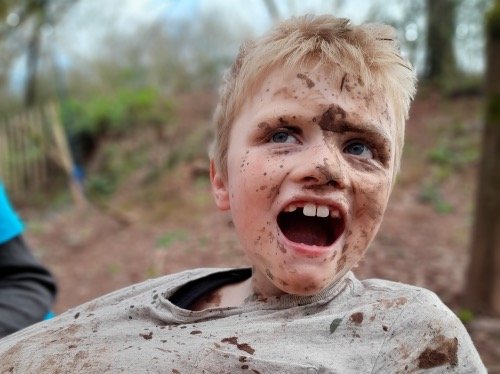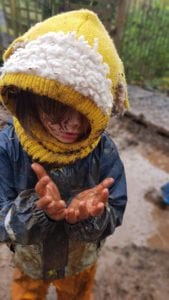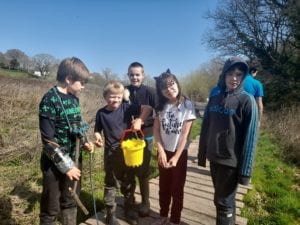
Every year during the month of April we celebrate World Autism Awareness Month (WAAM). This month is used to amplify voices of autistic people and to help raise awareness of supporting children and young people with autism. It’s a month which aims to help people understand autism by facilitating conversations about it through fundraising, social media campaigns and education.
We thought that in order to celebrate, we would highlight some of the benefits forest school and outdoor learning can have for autistic children and young people…indeed many of these benefits can also be shared with neurotypical children and children with a range of SEMH needs.
Some autistic people may experience differences in their proprioception. They may have difficulty in understanding where one’s body is in relation to other objects and find balance tricky. Being in a woodland environment offers huge amounts of proprioceptive input and exposure to help develop children’s skills. Using tools, climbing trees, crossing uneven terrain and creating and using obstacle courses are all opportunities readily available at forest school where proprioception and balance are engaged and practiced.
 Sensory
SensoryPuddle jumping, swinging, playing in the stream, bird song, hammocks, playing with mud, dappled sunlight, the smell of rain, the texture of bark, the calming benefits of green spaces… need I say more? Many sensory rooms in SEN schools artificially recreate the sensory environment that we naturally experience at forest school. Being outdoors means things that could be upsetting to hypersensitive (sensory avoidant) learners such as bright halogen bulbs are non-existent. Equally, hyposensitive (sensory seeking) learners have lots of opportunities to meet their needs, for example they can carry logs, climb or swing in order to experience deep pressure. This means our learners experience a rich sensory diet, creating a calm space where they can work through their emotions and reactions to certain stimuli. We firmly believe that meeting a child’s sensory needs must come first, by meeting the needs of our learners they are then able to engage in the range of learning opportunities that come their way at forest school.
A vital element of the forest school ethos is child initiated play and the benefits of this are vast. It gives staff the opportunity to build relationships with learners based on shared enjoyment and respect, and can give us as adults an insight into a learners special interest, signaling to them that their interest is valid and that we care. As educators, we can turn these interests into opportunities to learn, many links to the curriculum can easily be made and autistic learners may be very self motivated to learn and explore these areas of interest in great depth. Facilitating curiosities and interests of learners not only creates new learning opportunities but increases children’s confidence and helps develop social skills through shared experiences. Special interests discovered at forest school such as insects, nature and biodiversity can open the door to a range of fantastic career opportunities as our learners become young adults. This provides them the opportunity to excel in a fulfilling career they are passionate about that they may not have discovered if they were not able to explore their curiosities.
Never does a day go by at The Outdoors School when we don’t experience something new, whether it be buzzards flying over head, flowers blooming in spring or a dormouse making its home in our stationary drawer over the weekend! There is always something to spark conversation. Discussing our ever changing surroundings as seasons pass enriches language and gives lots of opportunities for less vocal learners to share what they have just found with peers and adults. We love the conversations these sparks of interest in nature creates and it inspires conversations that we would not be having if sat within the four walls of a classroom.
 Social Interaction
Social InteractionFinally, studies have shown that we interact better when we are feeling relaxed. The calming setting forest school provides is the perfect backdrop to lower anxiety and relax. This puts our learners in the right frame of mind to engage in the social interaction opportunities that The Outdoors School provides. For example, learners can shop at our swap shop, create games of limitless imagination in freeplay, eat and cook a meal with peers and work as a team to create something for the site. The relaxing environment also gives students the space they need to process social interactions and there are plenty of quiet relaxing spots they can retreat to when feeling overwhelmed. This allows them to socialise without the pressure that it could become too much, and over time they can increase their interactions with learners and staff in a comfortable way.
Autistic people can make significant contributions to society given the right environment, often outperforming neurotypical counterparts in auditory and visual tasks. Our hope as a school is to provide that right environment for our learners to gain confidence and skills they can take with them throughout their life. Every experience of autism is unique, every person has individual skills, attributes and characteristics that are as unique as our personalities. This is the power of neurodiversity and we hope as a forest school that we can support all our learners in stepping into their power.
Date: Saturday 17th April 2021
Sources:
https://www.autismtogether.co.uk/proprioception-and-autism-2/
https://mosswoodconnections.com/activity/child-led-or-child-directed/
https://www.livescience.com/16849-autism-advantages-research.html
Copyright © Outdoors Group Ltd 2021. All Rights Reserved.
Registered Office: The Outdoors Group, Western Lodge, Crediton, Devon, EX17 3NH. Company number 10755829
Terms & Conditions / Website Terms / Privacy Policy / Sitemap / Built with ♥ by Solve